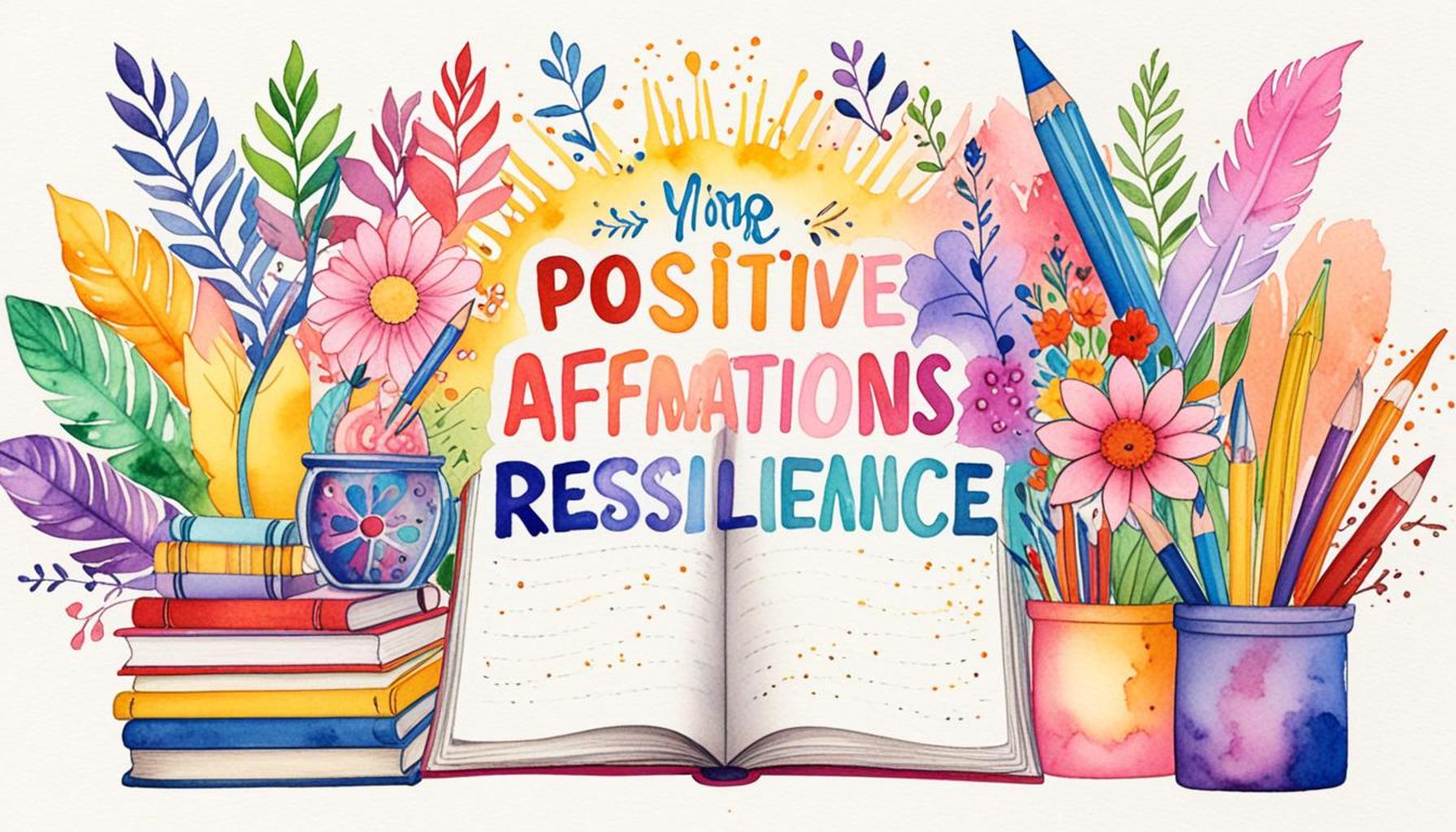Positive Affirmations: The Key to Cultivating Self-Confidence in Times of Insecurity

Empowering Change Through the Art of Affirmations
In a fast-paced world brimming with obstacles, the path to self-confidence can often seem overwhelming. However, one tool that remains unwaveringly effective is positive affirmations. These simple yet profound statements hold the potential to transform our mindset, providing strength and resilience in moments of vulnerability.
Picture this: you wake up each morning, the sun streaming through your window, and instead of the usual dread about the day ahead, you are filled with optimism and energy. Positive affirmations can help cultivate this empowering state of mind and facilitate personal growth in various ways:
- Reinforcement of Self-Worth: By consistently repeating affirmations, such as “I am deserving of love and respect,” you reinforce your sense of value and foster self-acceptance. This practice can be particularly beneficial in societies like Nigeria, where community expectations can sometimes overshadow individual ambitions.
- Clarity in Goals: Positive affirmations can sharpen your focus, drawing your aspirations into clearer view. Statements like “I am capable of achieving my dreams” can serve as a guiding light, helping you navigate the complexities of life, whether it’s seeking success in academics or pursuing a fulfilling career.
- Reduction in Negative Self-Talk: Affirmations help mitigate the damaging effects of limiting beliefs that can impede progress. Instead of being bogged down by thoughts like “I will never succeed,” replacing them with affirmations such as “Every step I take brings me closer to my goals” empowers the self and nurtures a growth mindset.
The relevance of positive affirmations is especially pronounced in Nigeria, where societal pressures can lead to profound self-doubt. Students navigating the rigorous academic landscape, young professionals facing a competitive job market, and individuals grappling with personal challenges can all benefit from adopting this empowering practice. In a culture that often emphasizes communal expectations, reclaiming one’s narrative through positive self-dialogue is essential.
Incorporating affirmations into daily routines can be simple yet transformative. Start with a few affirmations that resonate with you and repeat them daily—perhaps while in the shower or during your morning commute. Techniques such as writing them down in a journal or using visual reminders can also enhance their impact. Over time, as you consistently affirm your strengths and aspirations, you’ll likely notice a gradual shift in your outlook and confidence.
As we continue to explore the world of positive affirmations, it becomes clear that they are not merely words spoken in the moment; they are a foundation for lasting self-confidence. In a landscape filled with challenges, let us embrace the power of words to uplift our spirits, shaping a brighter future for ourselves and those around us.

CHECK OUT: Click here to explore more
The Science Behind Positive Affirmations
Understanding the mechanics of positive affirmations reveals why they can be so effective in cultivating self-confidence, particularly in times of uncertainty. At their core, affirmations are simple statements designed to challenge and combat negative self-perceptions. When spoken or thought about regularly, they have the potential to rewire our brains, influencing the way we perceive ourselves and our capabilities.
Research in the field of psychology supports the efficacy of positive affirmations. Studies have shown that affirmations can foster a sense of self-integrity, a psychological concept that refers to the understanding of oneself as a competent and moral individual. For instance, when individuals articulate phrases like “I am capable of tackling any challenge,” they not only reinforce their resilience but also diminish anxiety and fear of failure. This practice is especially relevant in Nigeria, where cultural nuances often weigh heavily on personal performance, making self-worth prone to external pressures.
The Role of Consistency in Affirmation Practices
The power of affirmations lies in their repetition. Just like any skill, self-confidence grows stronger with consistent practice. Implementing a daily routine that includes affirmations can solidify one’s self-belief over time. Here are some effective ways to integrate affirmations into your daily life:
- Morning Rituals: Begin your day with positive affirmations. This can be as simple as reciting statements about your strengths while enjoying a cup of tea or coffee.
- Visual Prompts: Write affirmations on sticky notes and place them in visible areas, such as your mirror, refrigerator, or workspace. This visual reinforcement can spark a positive mindset throughout your day.
- Mindfulness Meditation: Incorporate affirmations into your meditation practice. As you focus on your breath, weave in affirmations that encourage self-love and reassurance, such as “I am worthy of success.”
- Evening Reflections: Before bed, take a moment to reflect on your accomplishments, no matter how small, and affirm your capabilities for the following day. Statements like “I have the strength to face new challenges tomorrow” can be particularly impactful.
By embedding these simple practices into everyday life, individuals can create a positive feedback loop that builds their self-esteem and empowers them to confront insecurities more assertively. In the Nigerian context, where communal expectations and societal definitions of success often loom large, the adoption of positive affirmations can be a powerful counter-narrative, enabling individuals to reclaim their power and build authentic self-confidence.
As we delve deeper into the transformative impacts of positive affirmations, it becomes evident that they extend far beyond mere self-statements. They foster a profound shift in perception, laying the groundwork for a confident and resilient self, essential for navigating the complexities of life.
Exploring the Power of Positive Affirmations
Positive affirmations are powerful tools that can significantly enhance self-confidence, particularly during moments of insecurity. These affirmations are short, positive statements that are designed to challenge and overcome self-sabotaging thoughts. When repeated frequently, they can easily shift one’s mindset and open up new avenues of self-belief.
When practicing positive affirmations, it is essential to focus on the present tense, which reinforces the notion of already embodying the qualities one wants to attract. For instance, instead of saying, “I will be confident,” a more effective affirmation would be, “I am confident.” This simple yet profound shift helps to solidify the idea in the subconscious mind, fostering a sense of empowerment.
The Science Behind Affirmations
Research supports the idea that positive affirmations can stimulate neural pathways associated with self-acceptance and well-being. A study conducted at the University of California found that participants who engaged in self-affirmation exercises showed higher resilience to stress and improved performance on tasks requiring self-control. This data suggests that harnessing the practice of positive affirmations can be a practical method to build and maintain self-confidence, especially in high-pressure environments.
Creating Your Affirmation Practice
Developing a personalized affirmation practice involves identifying areas in life where self-doubt tends to creep in. By pinpointing these insecurities, individuals can craft tailored affirmations. For example, someone struggling with public speaking might use the affirmation, “I shine when I speak in front of others.” Consistency is crucial; incorporating these affirmations into daily routines, such as during morning rituals or self-reflection sessions, can lead to profound transformations over time.
Incorporating positive affirmations as a regular part of one’s daily life not only nurtures self-confidence but also promotes a greater overall sense of mental well-being. As we address insecurities, building a foundation of self-love through affirmations encourages a cycle of positivity that can resonate through all aspects of life.
| Category | Benefits |
|---|---|
| Increased Self-Awareness | Encourages individuals to recognize and confront their insecurities. |
| Stress Reduction | Supports emotional well-being and decreases anxiety levels. |
By integrating positive affirmations into daily routines, individuals can experience profound shifts in their self-confidence and overall mindset.
CHECK OUT: Click here to explore more
The Practical Benefits of Positive Affirmations in Daily Life
Beyond their scientific underpinnings, the practical benefits of positive affirmations are manifest in daily experiences and interactions. For many individuals, especially in contexts where cultural and societal expectations can be stark, the reinforcement provided by affirmations can serve as a vital buffer against insecurity and self-doubt. In Nigeria, where communal opinions can significantly impact personal identity, asserting one’s self-worth becomes paramount in the face of external pressures.
One of the most immediate advantages of using positive affirmations is their ability to enhance mental resilience. People who regularly engage with affirmations often report a heightened ability to cope with stress and navigate challenges more effectively. This can be particularly valuable in high-pressure environments, such as the bustling Nigerian business landscape, where competition is fierce and the fear of failure looms large. Affirmations such as “I am capable of achieving my goals” can galvanize individuals, propelling them to take calculated risks without the paralyzing fear of rejection or criticism.
Affirmations as a Tool for Empowerment
In addition to resilience, positive affirmations often serve as an essential tool for empowerment. For instance, consider the power dynamics in certain professional settings, especially where gender inequality may persist. Women aspiring to climb the corporate ladder may find benefit in affirmations that challenge limiting beliefs about their potential. Statements such as “I deserve a seat at the table” or “My contributions are valuable” can not only nurture self-confidence but also inspire them to advocate for themselves in the workplace.
The ripple effects of this empowerment extend into personal relationships as well. When individuals embrace affirmations, they project a stronger sense of self, which can lead to healthier interactions and reduced conflict. This is particularly relevant within familial structures in Nigeria, where extended family influences can often blur personal boundaries. Affirmed individuals may find themselves setting healthier limits, resulting in more constructive and respectful relationships.
Affirmations and Cultural Context
It is essential to consider how positive affirmations can be tailored to resonate within different cultural frameworks. In Nigeria, incorporating local dialects or culturally relevant references into affirmations can enhance their impact. For example, affirmations like “I am strong like a lion” or “My destiny is in my hands” not only resonate more deeply but also reflect the rich cultural heritage of determination and strength found in African proverbs.
Additionally, sharing affirmations in community settings can create a supportive atmosphere. Group sessions where participants recite affirmations together can cultivate a sense of unity and collective strength, fostering an environment that values self-confidence as a communal asset rather than merely an individual endeavor.
The intersection of positive affirmations with local traditions and practices illustrates their versatility and accessibility. As these affirmations permeate daily life, they allow individuals to challenge societal norms that may contribute to insecurities, thereby fostering a culture of self-acceptance and resilience. In these ways, positive affirmations can indeed be the key to unlocking greater self-confidence in times of uncertainty.
CHECK OUT: Click here to explore more
Embracing the Power of Positive Affirmations
In conclusion, positive affirmations emerge as a transformative practice that plays a critical role in cultivating self-confidence, especially in the face of insecurity. Whether navigating the complexities of professional environments or confronting personal challenges, the consistent reinforcement of affirmations helps individuals build mental resilience and empower themselves in all facets of life. The cultural relevance of these affirmations, particularly within Nigerian society, illustrates their versatility and the profound impact they can have when tailored to resonate with local values and beliefs.
As individuals embrace tailored affirmations that reflect their unique circumstances, they not only enhance their self-worth but also inspire those around them to do the same. This communal approach encourages collective growth and self-acceptance, breaking down barriers of negativity that might otherwise hinder progress. The act of sharing affirmations within community settings establishes a stronger support network, reinforcing the belief that self-confidence can be a shared journey.
Ultimately, by incorporating positive affirmations into daily routines, individuals can challenge the insecurities rooted in societal expectations and familial dynamics. In acknowledging their worth and embracing their potential, they pave the way for a brighter, more confident future. Therefore, leveraging the power of positive affirmations is not just a personal endeavor but a path toward a collective awakening, inspiring individuals and communities alike to rise above self-doubt and step confidently into their rightful place in society.


